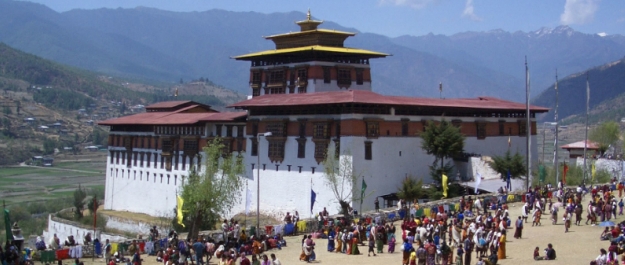Ensuring Bhutan stays happy – and safe

Unlike its neighbours, Bhutan hasn’t experienced a major earthquake for some while. But is the clock ticking?
The challenge
The Kingdom of Bhutan lies along the same Himalayan belt as Nepal, where a significant and devastating earthquake struck in 2015. Yet despite its proximity to major seismic disruption, Bhutan has avoided serious recent damage.
The region’s tectonic movement and fault network is poorly understood, but we do know that the region is capable of producing a very large earthquake and will do so again at some point in the future.
Earthquake timescales are famously unpredictable, but these low probability, high impact events pose a unique threat to entire societies, especially when coupled with Bhutan’s rapidly growing, urbanising population and fragile building techniques.
What we’re doing
By mixing academic researchers with engineering experts and empowered policymakers from Bhutan, the UK and USA, we’re helping the Bhutanese people prepare for the risks they may face. Led by the University of Bristol, it’s a global team effort working on many fronts.
For example, we’re investigating the written and oral histories of local communities to understand how they’ve handled and been affected by past disasters, while my own experience of studying the country’s complex geological evolution will help us determine the likelihood of future seismic events. I'm is looking for indicators, such as the grinding and mixing of contrasting rock types, which mark out potential fault zones.
How it helps
The first stage of our collaborative project will produce seismic hazard maps for Bhutan that highlight key earthquake danger areas. From these, we can help decision-makers refine plans for both emergency responses and safe future development.
It’s important that our work considers the unique culture of Bhutan. This is a place that measures success in terms of its population’s happiness and where traditionally-built homes, environmental respect and more are founded on long-standing values. It’s inappropriate to simply impose our own perspectives, so we’ll continue to deepen our relationships with institutions and agencies on the ground to gain a greater understanding of what Bhutan really needs to establish its earthquake resilience.
 Lead researcher profile
Lead researcher profile
Dr Frances Cooper, Senior Lecturer
Related research centres
Partner organisations
- Bhutan’s Department of Geology and Mines
- The Royal University of Bhutan
- The Shejun Agency for Bhutan’s Cultural Documentation and Research